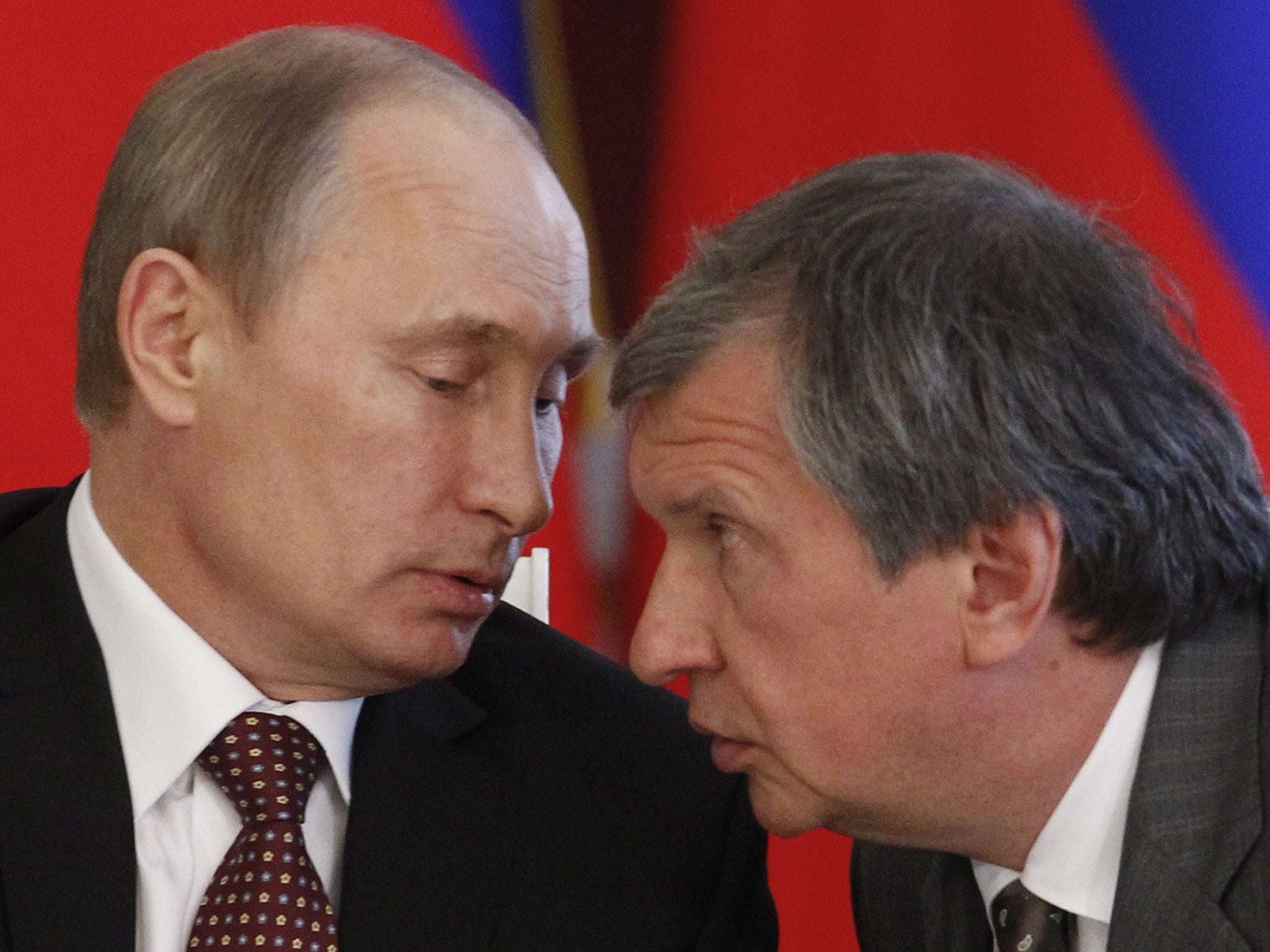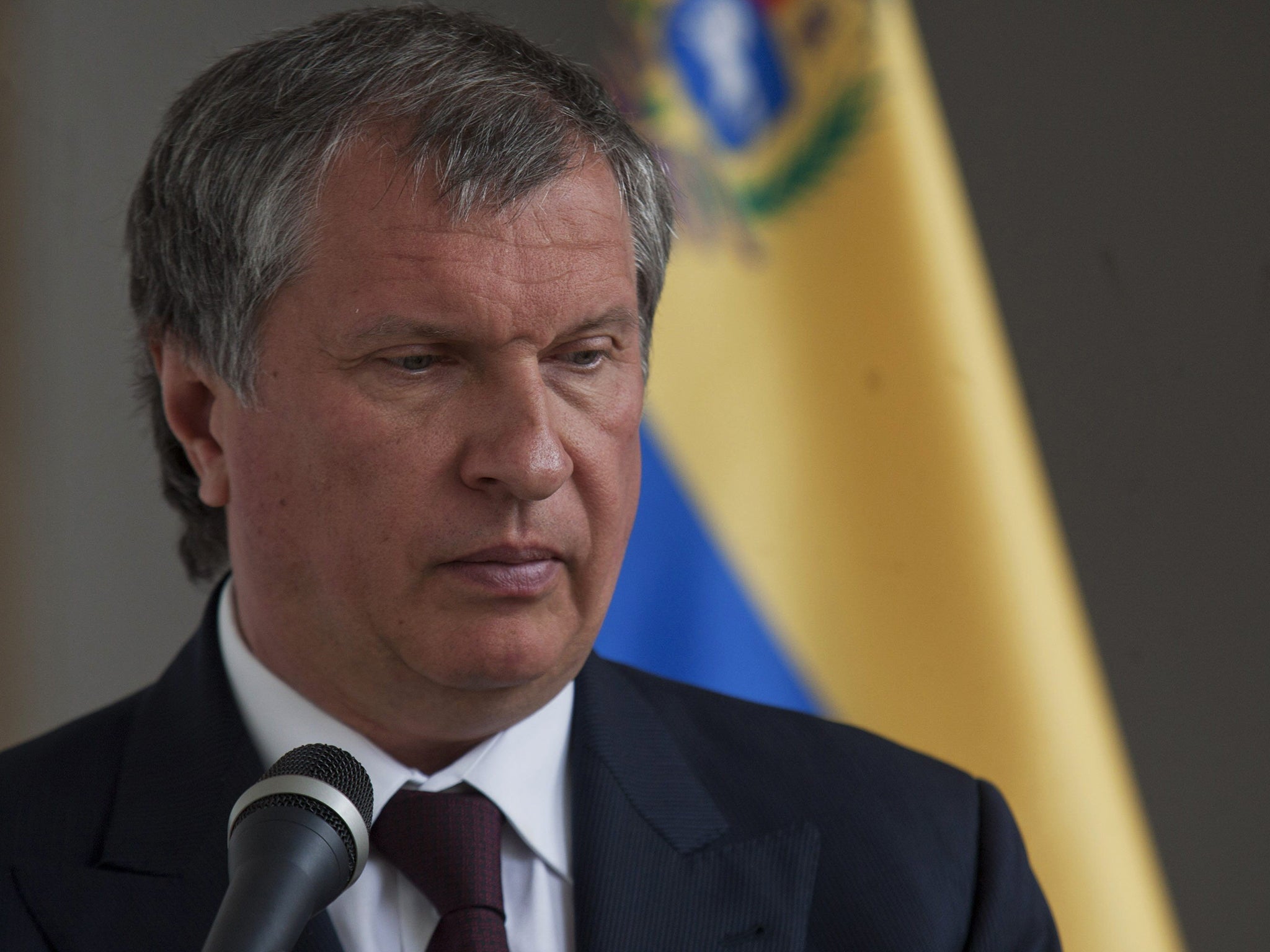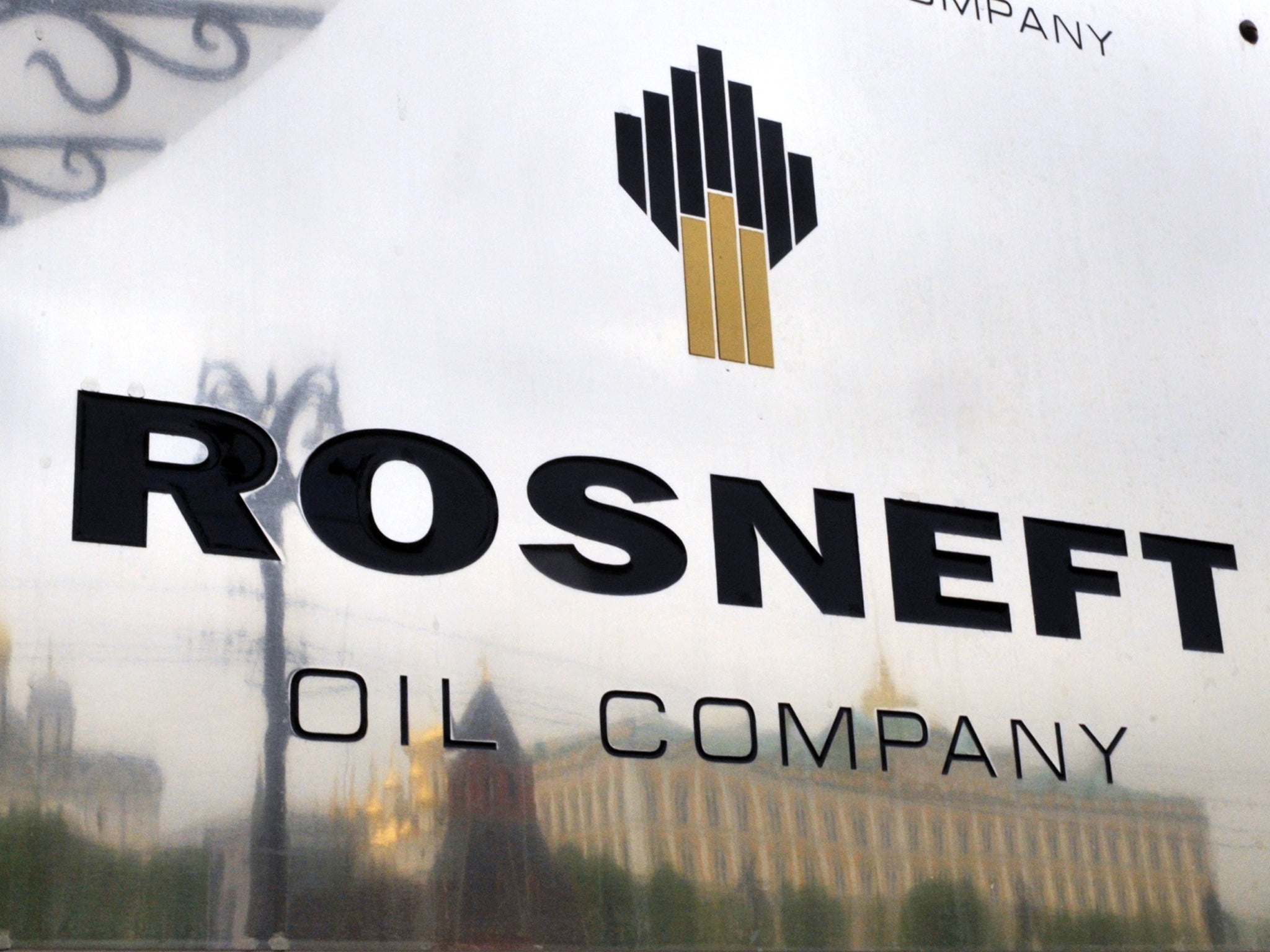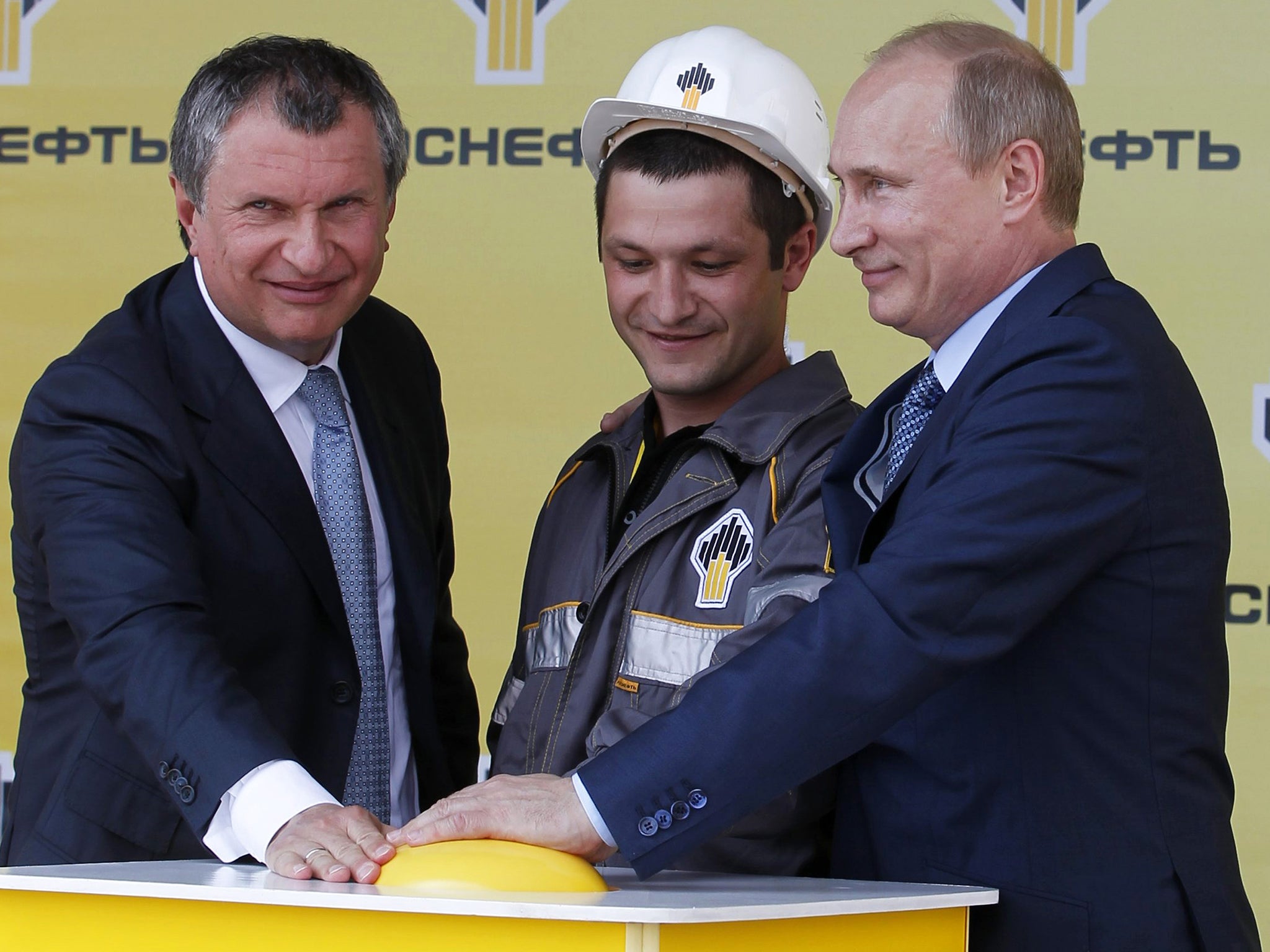Igor Sechin: The oil man at the heart of Putin's Kremlin
Exclusive: Igor Sechin runs Rosneft, the biggest publicly traded oil firm in the world. He tells City Editor Jim Armitage about sanctions, the oil price and his admiration for BP

Your support helps us to tell the story
From reproductive rights to climate change to Big Tech, The Independent is on the ground when the story is developing. Whether it's investigating the financials of Elon Musk's pro-Trump PAC or producing our latest documentary, 'The A Word', which shines a light on the American women fighting for reproductive rights, we know how important it is to parse out the facts from the messaging.
At such a critical moment in US history, we need reporters on the ground. Your donation allows us to keep sending journalists to speak to both sides of the story.
The Independent is trusted by Americans across the entire political spectrum. And unlike many other quality news outlets, we choose not to lock Americans out of our reporting and analysis with paywalls. We believe quality journalism should be available to everyone, paid for by those who can afford it.
Your support makes all the difference.Igor Sechin, the boss of Russian oil behemoth Rosneft and one of the most powerful men in Russia, has declared European sanctions against his giant state-controlled organisation are an illegal affront to democracy.
In a rare interview, the man widely seen as being Vladimir Putin’s closest adviser said the world economy faced “severe consequences” as a result of the sanctions, which he said were “absolutely illegal and illegitimate”.
He also spoke of how Rosneft – 20 per cent owned by Britain’s BP – will cope with the collapse in the oil price, revealing that the company will be cutting its capital expenditure programme for this year by “approximately 30 per cent”. That will represent a savage reduction on 2014’s spend, said in October to be $14bn-$16bn. It follows cuts announced recently by other major firms around the world totalling $65bn.
Although predicting continued volatility and saying he did not want to get into a “guessing game”, he said the oil price could start to rise again in the final quarter of this year. This was because the current oversupply of oil was insignificant compared with previous oil crises like 1985, so the fundamental supply and demand equation did not justify the current price slump. Moreover, demand is rising, primarily in Asia, and not falling like it was in 1985, he said.
He repeatedly expressed his concerns that there could be a global shortage of oil if companies did not return to investing in production and output.

If investment levels recovered, next year’s price would be $60-$80 a barrel, he said. However, if they do not, and the supply-demand equation was not rebalanced, it could bounce back to $100-$110 as the lack of investment in drilling caused a shortfall in production.
He talked for the first time of his close bond with the senior management of BP, particularly Bob Dudley, the US-born chief executive who famously fled Russia in fear of his safety during BP’s battle with the oligarch partners of its BP-TNK joint venture.
And, speaking after Rosneft’s legal case against EU sanctions was sent from the High Court in London to the European Court of Justice, he declared: “We are fighting: the knot will be untied.”
Mr Sechin said Rosneft was prepared for a long haul in its battle to overturn the sanctions, placed on both him and the company by the US and EU authorities in response to the Ukraine conflict.
Asked about the prospects of the time extension of the case’s move from London to the European Court, he said wryly: “Instead of three years, the case may be a year and a half… What can you do? I don’t know if the case will be tried on merit and our claims will be justly reviewed and evaluated.”
He attacked the European authorities for the way the sanctions were applied in such a way to ban legal appeals against them: “That is what concerns me most… The EU imposed a ban in the European Court on accepting claims from Russian entities and individuals that have been subjected to sanctions. [This] has severe consequences, including consequences for European democracy. Is there an independent rule of law?”
Asked what his message would be to the governments of Europe, Britain and the US about the sanctions situation, he declared: “I am not a politician. I am just a manager. I can only wish them success in building a multipolar world for the benefit of all countries and nations.”
He added: “The sanctions have reverse effects: they damage international shareholders and international stakeholders, they damage partners that manufacture process equipment, they damage banks and investment funds who will not be able to invest in the development of industries in Russia. All those will face severe consequences.”
He added: “The world economy will face severe consequences. The application of sanctions against the company cannot be justified. We are not a subject of political decisions, so the extension of sanctions to the corporate level is absolutely illegal and illegitimate.”
He said it was not just Russians who suffered: 300,000 German jobs rely on equipment supplies to Russia.
Mr Sechin spoke at length about the current turmoil of the global oil market, saying the speed of the 2014 crisis exceeded anything before. Oil has crashed from $115 a barrel in June to just $57 today.
But despite Rosneft’s plans to reduce expenditure, he declared there would be no job cuts among its 235,000-strong workforce because the company is hiring crews to develop its in-house capabilities so as to rely less on outside contractors.
In the UK oil industry, Mr Sechin is best-known for the way he drove negotiations to strike a $53bn deal with BP and a group of Soviet-born oligarchs.
BP had tried with Mr Sechin to form an alliance with Rosneft in 2011 to jointly develop Russia’s Arctic shelf. But BP was already in a joint venture on Russia called TNK-BP with a group of oligarchs and Russia’s Alfa Bank. These partners, known as the AAR consortium, were outraged at the proposed BP-Rosneft alliance and successfully had it overturned in court. It was seen as a severe blow both to Mr Dudley and Mr Sechin.
Relations between the oligarchs and BP went from bad to worse until BP eventually declared it wanted to sell its stake in TNK-BP.

Mr Sechin said Rosneft would buy it. This was seen as a tactical manoeuvre to force the oligarchs to sell their half to Rosneft as well: Mr Sechin guessed AAR would never want to be joint shareholders in a Russian state-owned company run by Mr Putin’s right-hand man. The plan worked: BP sold its stake for $22bn plus a 20 per cent stake in Rosneft – a deal totalling $28bn. Rosneft paid AAR $27.73bn in cash in a deal closed in March 2013.
However, that transaction was completed when the oil price was above $100 a barrel, leading to accusations recently that Rosneft overpaid while the oligarchs and Alfa-Bank got the deal of the century.
But Mr Sechin refuted this when asked if he regretted the price: “Regret is not the word here. I think we can be proud we had the opportunity to strike a deal this complicated. We continue to increase synergy so the efficiency of the acquisition grows.”
He denied talk of a cantankerous relationship with the oligarchs, saying of the deal process: “You need to understand how challenging that job itself was, and how different the [various parties’] interests were. And everyone was standing their ground… During the stages that led to execution of that deal we did have some rough moments and we did have some discussions but that did not lead to any tensions in terms of personal relationships.”
Asked how he felt about the oligarchs now, he said: “They are very decent people, all of them.” He recently met Alfa-Bank chief Petr Aven. “He said he was missing me,” Mr Sechin laughed.
The long period of working with BP over the years had led to a strong bond with BP chief executive Mr Dudley and his predecessor Tony Hayward, who left in the aftermath of the Gulf of Mexico spill. “We have known each other for a long time. I am very familiar and very well acquainted with the members of the board and directors of BP.
“That is what I call trust and mutual consideration. Those things helped us successfully go through that enormous transaction – the largest acquisition in the history of oil and gas.”
The TNK transaction has left Rosneft with huge debts to repay. Given the collapse in the oil price and sanctions on the company, some investors have been concerned whether repayments are affordable, with some speculation Rosneft may seek to renegotiate terms or even default.

But Mr Sechin said: “I do not think there is any need to renegotiate it. We are managing all the payment schedules.”
Yesterday, the company paid the latest instalment of $7bn. Mr Sechin said other payments would also be made, adding: “The basis for our optimism is the actual economic performance of the company. Last year, the company’s revenue was $146bn.”
He dismissed talk of drawing on Russian state funds, saying repayments would be met from internal company funds. Despite the pressures faced by the company, it would also continue paying its dividend at 25 per cent of net profits.
The TNK-BP deal was one of the biggest steps in the Kremlin’s regrouping of Russia’s energy assets, which were split up during the Yeltsin era and sold often on the cheap to the oligarchs.
Asked if he might consider more deals, such as a takeover of Lukoil, he laughed, saying: “What does Lukoil have to do with that? In crisis there is always a good opportunity for mergers and acquisitions, but we are not looking at Lukoil.” He later added: “We don’t comment on the rumours. There is no such offer on the market now. That is why we do not comment on it.”
Sechin also denied speculation that Rosneft aims to consolidate the sector more generally: “This is impossible, these options will never be considered. The Russian oil and gas industry constitutes a part of the global oil and gas sector, foreign investors own around 25 per cent of it. And I would like to reiterate that Rosneft did not receive its assets through privatisation but acquired them on market-based terms – by paying for them.”
Mr Sechin also warned of the risk of manipulation of the oil market by financial investors and those “paper traders” who speculate on the price. He raised parallels with Libor fixing and the bogus valuations by credit rating agencies of US sub-prime mortgages.
The shares of US shale oil producers resembled the dotcom bubble of 1999, he hinted, pointing out that European exploration and production companies’ shares fell 42 per cent last year while US shale oil producers were still at January 2014 levels.
“Is it another bubble?” he asked.
He cited the example of America’s EOG, which is valued 34 per cent higher than Lukoil despite having 3.9 times lower reserves.
He also railed against the US for protectionism, saying: “Can you answer a simple question: why have the US been restricting oil exports from their country for 40 years? They are protecting their own refineries. They are providing competitive advantage for American refining.
“Can you imagine the same actions taken by someone like the Russian Federation? Let’s say Russia said ‘no more oil exports: refined products only’. What do you think the market would feel?… But we’re not taking that path. One needs to be reasonable.”
Not so green: Sechin on the environment
Igor Sechin is unlikely to win any awards from Greenpeace. He joked of how, at a conference this week where he was speaking, a member of the audience said people should be limited to alternative energy sources.
“I can tell you I am not a big expert in that area but I know a few things. First of all, we are the subject of global climate change cycles. I actually comforted the guy. I said: ‘Those cycles repeat every 30 million years, so everything is normal. The human effect on the environment is less than any volcano. A volcanic eruption produces more Co2 than any human activity. The rotting of algae in the ocean significantly exceeds any man-made effect, so one should be calm about it.”
He did praise alternative energy, but stressed that it was expensive and that consumers would have to pay extra for it. “I am confidently saying that there should be no barriers. Both oil and gas need to be produced.
“Energy security needs to be provided for economic growth and the increase of people’s wealth throughout the planet.”
Join our commenting forum
Join thought-provoking conversations, follow other Independent readers and see their replies
Comments